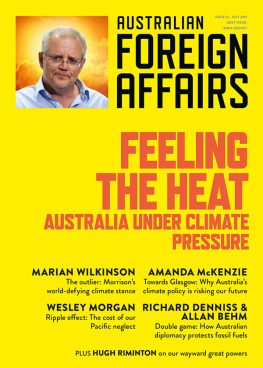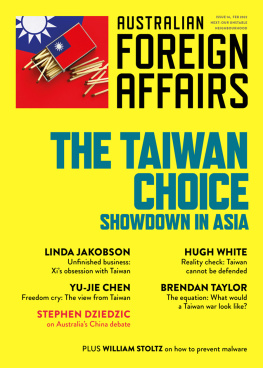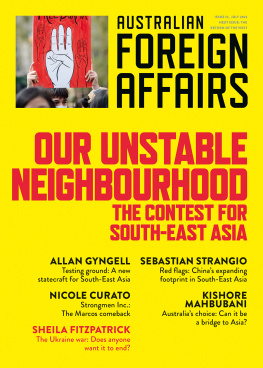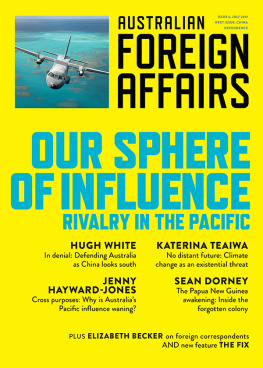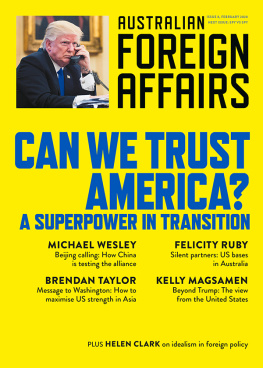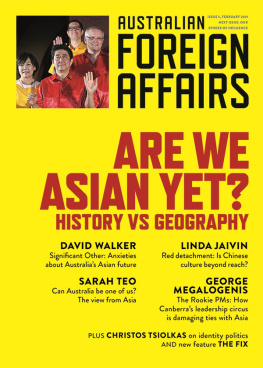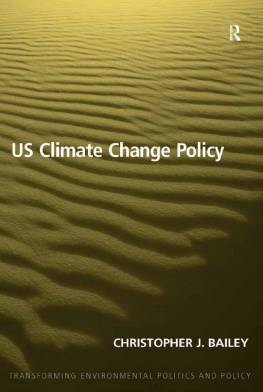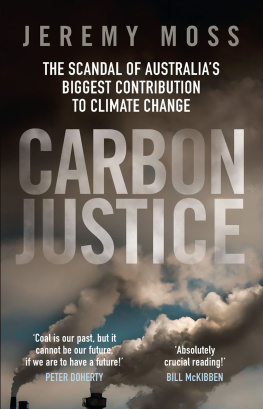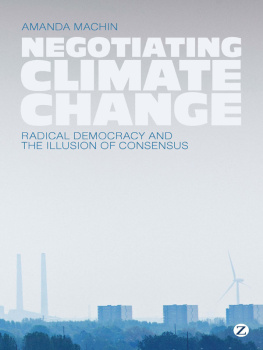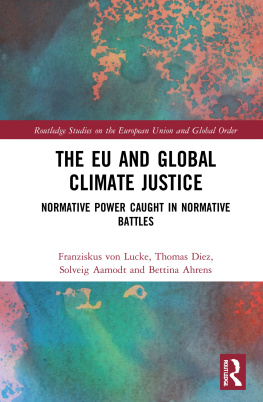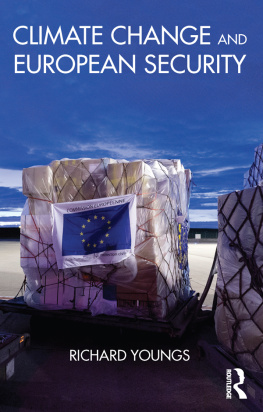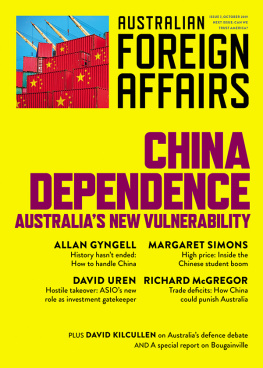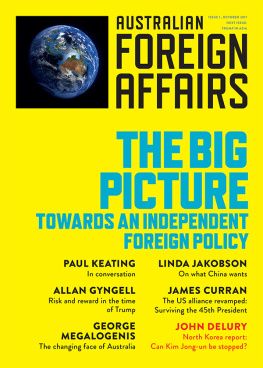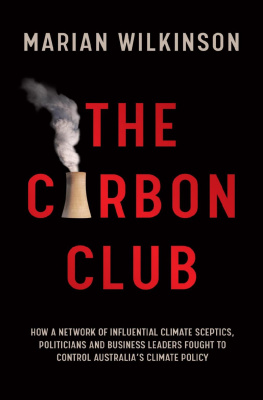Contributors
Allan Behm is the director of international and security affairs at the Australia Institute.
Anthony Bergin is a senior fellow with the Australian Strategic Policy Institute.
David Brophy is a senior lecturer in Modern Chinese History at the University of Sydney.
Richard Denniss is the chief economist at the Australia Institute.
Amanda McKenzie is the CEO and co-founder of The Climate Council.
Wesley Morgan is a research fellow at the Griffith Asia Institute at Griffith University.
Hugh Riminton is national affairs editor at Network Ten and a former reporter and news presenter for CNN.
Michelle Aung Thin is a novelist, essayist and senior lecturer at RMIT University and the author of several novels.
Jeffrey Wall has been a senior adviser on Papua New Guinea and a consultant to the World Bank.
Marian Wilkinson is a Walkley Awardwinning journalist and author of The Carbon Club.
Australian Foreign Affairs is published three times a year by Schwartz Books Pty Ltd. Publisher: Morry Schwartz. ISBN 978-1-74382-180-0 ISSN 2208-5912 ALL RIGHTS RESERVED. No part of this publication may be reproduced, stored in a retrieval system, or transmitted in any form by any means, electronic, mechanical, photocopying, recording or otherwise, without the prior consent of the publishers. Essays, reviews and correspondence retained by the authors. Subscriptions 1 year print & digital auto-renew (3 issues): $49.99 within Australia incl. GST. 1 year print and digital subscription (3 issues): $59.99 within Australia incl. GST. 2 year print & digital (6 issues): $114.99 within Australia incl. GST. 1 year digital only auto-renew: $29.99. Payment may be made by MasterCard, Visa or Amex, or by cheque made out to Schwartz Books Pty Ltd. Payment includes postage and handling. To subscribe, fill out the form inside this issue, subscribe online at www.australianforeignaffairs.com, email subscribe@australianforeignaffairs.com or phone 1800 077 514 / 61 3 9486 0288. Correspondence should be addressed to: The Editor, Australian Foreign Affairs, Level 1, 221 Drummond Street, Carlton VIC 3053 Australia Phone: 61 3 9486 0288 / Fax: 61 3 9486 0244 Email: enquiries@australianforeignaffairs.com Editor: Jonathan Pearlman. Deputy Editor: Julia Carlomagno. Associate Editor: Chris Feik. Consulting Editor: Allan Gyngell. Digital Editor and Marketing: Amy Rudder. Editorial Intern: Lachlan McIntosh. Management: Elisabeth Young. Subscriptions: Iryna Byelyayeva and Sam Perazzo. Publicity: Anna Lensky. Design: Peter Long. Production Coordination and Typesetting: Tristan Main. Cover photographs by Ed Connor / Shutterstock (clouds) and Kelly Barnes / AAP (Morrison).
FEELING THE HEAT
Australia has always taken a shrewd, calculating approach to pursuing prosperity and influence in a world in which it is not powerful enough alone to guarantee its own security or to change the global order.
Its method is to sidle up to wealthier and stronger partners, and to support a set of international rules and bodies that make it harder for the most powerful nations to impose their will on others. This approach has led to Australias close ties to countries such as the United States, Japan and the United Kingdom, and to its vocal support expressed at every opportunity by successive foreign ministers for promoting the rules-based order.
But there is a glaring exception to the nations practice of its own well-worn foreign policy.
In recent years, as the need to address climate change has shifted to the centre of the international agenda, Australia has stayed still. Its reluctance to act is now putting it at odds with both its allies, and with the system of international rule-making.
The world has reached a consensus around the need for collective action on climate change. Despite the deteriorating ties between the United States and China, and their continued trade war, the two countries issued a joint statement on the climate crisis in April and committed to raising global climate ambition. Both Joe Biden and Xi Jinping have committed to a net-zero emissions target. According to the London-based Energy and Climate Intelligence Unit, 132 countries have now adopted or are considering adopting net-zero emissions targets. The list includes South Korea, Germany, France, Brazil, Somalia, Lebanon and Laos but not Australia.
The Coalitions current stance particularly its resistance to stronger carbon emission reduction targets is not just an evasion of science. It also undercuts Australias ties with its closest partners, and its Pacific step-up, and its potential to steer the new global clean economy. It is a failure of foreign policy.
Former prime minister Malcolm Turnbull recently summed up this failure during an event at the Lowy Institute: We are more out of step on climate with the rest of the world and in particular our closest friends and allies than we have ever been on any big international issue.
In April this year, Biden convened a climate summit and declared: The cost of inaction keeps mounting. The United States isnt waiting. Xi, in attendance, called for common progress in the new journey toward global carbon neutrality. As the European Union, the United Kingdom, Canada and others all promised stronger emissions reduction targets, Prime Minister Scott Morrison made no new commitments and relied instead on his governments much-disputed claim that it is on track to meet its targets promised under the Paris Agreement. He told the summit: Future generations will thank us not for what we have promised, but what we deliver.
But Morrisons stance is a rejection of the international communitys approach to tackling climate change. The push for stronger targets was not the sudden consequence of a more progressive candidate winning last years US election. It was always intended that the Paris Agreement would establish initial targets, and that countries would then strengthen them.
At the upcoming climate conference in Glasgow in November, countries will present plans for achieving these stronger targets. Australia will need to decide whether it wants to pursue a climate policy that accords with the international consensus, or to undermine the foreign policy that has, for so long, guaranteed its stability and security.
Australia is under pressure to act. The appeals from its partners are genuine, as are the threats of sanctions and retribution. Its options and opportunities need to be understood, as do the consequences of inaction. Australias climate policy is not just a matter of domestic debate it is an indispensable part of the nations foreign affairs.
Jonathan Pearlman
THE OUTLIER
Morrisons world-defying climate stance
Marian Wilkinson
Lesley Hughes doesnt get a lot of invitations from the Morrison government to sit at the top table. The high-profile climate scientist was unceremoniously sacked, along with the entire Climate Commission, shortly after Tony Abbott became prime minister. His successors have shunned her advice ever since. So it was surprising to see Professor Hughes on stage in Sydney as a guest speaker at a climate leadership event organised by the British consulate general to celebrate this years International Womens Day.
As the invitees tucked into breakfast at The Mint museum, Hughes was quizzed on the looming climate crisis by Sam Mostyn, president of Chief Executive Women and networker extraordinaire. Joining them on stage were a feisty grassroots climate activist and the CEO of a start-up that offsets personal carbon footprints.

